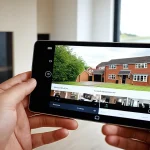Technological Advancements Transforming UK Education
Digital transformation is significantly reshaping UK education technology, bringing innovative changes to schools and universities. One of the most prominent shifts is the widespread adoption of smart classrooms, which integrate connected devices, interactive whiteboards, and real-time data analytics to enhance learning experiences. These classrooms enable teachers to deliver engaging content tailored to individual student needs, promoting active participation and deeper understanding.
The implementation of digital tools goes beyond hardware. Software platforms supporting collaborative work, instant feedback, and digital assessments are becoming standard, facilitating more responsive and adaptive teaching approaches. Moreover, automation technologies are streamlining administrative tasks, giving educators more time to focus on instruction.
Also read : What impact does UK technology have on cybersecurity innovation?
Artificial intelligence plays a growing role in personalizing learning experiences. AI-powered systems analyze student performance to recommend tailored study materials, identify learning gaps, and suggest interventions early on. These technologies support differentiated instruction, ensuring that students progress at a pace suited to their abilities. The integration of AI and automation also introduces efficiency in managing large datasets related to student performance, enabling educators and administrators to make informed decisions quickly.
In summary, the convergence of UK education technology, smart classrooms, and AI is creating a dynamic and responsive learning environment. These technological advancements empower both teachers and students, fostering improved engagement, adaptability, and ultimately better educational outcomes.
Additional reading : What innovations in fintech are coming out of the UK?
Key Digital Tools and E-Learning Platforms in the UK
The UK EdTech platforms landscape features a wide array of e-learning solutions transforming classroom technology across schools and universities. These platforms provide interactive content, real-time assessment tools, and collaborative features that support diverse teaching methods. Popular offerings include tailored learning environments designed to accommodate different subjects and student abilities, significantly enhancing engagement and knowledge retention.
Innovative classroom technology devices are integral to modern learning spaces. Smartboards, tablets, and wireless response systems empower teachers to deliver dynamic lessons while enabling students to participate actively. These tools integrate seamlessly with e-learning platforms, creating synchronous and asynchronous learning experiences that extend beyond the physical classroom.
Examples of UK-developed educational apps and software demonstrate significant advancement in the EdTech sector. These solutions often target specific learning needs such as literacy, numeracy, and science education, using gamification and adaptive learning techniques. By continuously monitoring progress and adjusting difficulty levels, these apps provide personalized pathways that support student success.
In summary, the combination of UK EdTech platforms, innovative classroom technology, and specialised software solutions fosters a flexible and effective learning environment throughout the UK education system. This synergy between digital tools and teaching strategies is reshaping how education is delivered and experienced.
Technological Advancements Transforming UK Education
Rapid digital transformation is revolutionizing UK education technology, with smart classrooms leading this evolution. These smart classrooms go beyond conventional setups by integrating high-speed internet, interactive displays, and connected devices that facilitate immersive and adaptive learning experiences. Teachers can access real-time data analytics to monitor student progress instantly, enabling on-the-fly adjustments to lesson plans and personalized instruction.
The adoption of automation streamlines mundane administrative tasks, such as attendance tracking and grading, freeing educators to focus on pedagogical innovation. Artificial intelligence algorithms analyze large datasets from student interactions to detect learning patterns and predict areas where learners might struggle. This proactive insight supports interventions tailored to individual needs, increasing engagement and improving outcomes.
Moreover, smart classrooms foster collaborative learning through digital platforms, allowing students to participate actively both in-person and remotely. The integration of such technologies ensures that education in the UK keeps pace with global trends, promoting equity and access by accommodating diverse learning styles through adaptive content delivery. This cohesive blend of AI, automation, and connected devices exemplifies how UK education technology is reshaping teaching and learning environments at every level.
Technological Advancements Transforming UK Education
Digital transformation continues to drive profound changes in UK education technology, fundamentally altering how schools and universities operate. Central to this shift is the expansion of smart classrooms, which combine advanced hardware and software to create interactive and adaptive learning environments. These classrooms harness connected devices, such as tablets and interactive whiteboards, to enable seamless content delivery and foster student engagement through real-time feedback mechanisms.
The implementation of digital tools complements smart classrooms by supporting collaborative learning and instantaneous assessment. For example, educators use platforms that collect and analyze data on student performance during lessons, allowing immediate adjustment of teaching strategies. This approach promotes differentiated instruction, where the pace and content can be tailored to individual learner needs, improving overall comprehension and retention.
Artificial intelligence is increasingly embedded within these education technologies to augment learning experiences. AI algorithms process student data to identify knowledge gaps, recommend customised resources, and predict potential challenges before they become barriers. Moreover, automation streamlines administrative functions like grading and attendance monitoring, reducing teacher workload and increasing instructional time. Collectively, these advances exemplify how the fusion of smart classrooms, AI, and automation is transforming UK education into a more dynamic, efficient, and personalised system.
Technological Advancements Transforming UK Education
Digital transformation continues to revolutionize UK education technology, introducing sophisticated tools that extend beyond traditional classroom settings. The rise of smart classrooms integrates cutting-edge hardware like interactive touchscreens with advanced software that supports personalized learning paths. This seamless fusion allows educators to tailor content dynamically, responding to real-time data on student engagement and comprehension.
The adoption of artificial intelligence enhances these environments by continuously analyzing individual learner data to identify gaps and predict challenges. AI-driven recommendations enable targeted interventions, optimizing educational outcomes without overwhelming teachers. Automation also plays a crucial role in operational efficiency, managing routine tasks such as attendance and grading to free educators’ time for meaningful instruction.
Moreover, these advancements promote inclusivity by adjusting to diverse learning styles and needs. As a result, the evolving landscape of UK education technology powered by digital transformation and smart classrooms fosters more interactive, adaptive, and efficient learning experiences. This progress exemplifies how innovation is central to addressing the demands of modern education systems.
Technological Advancements Transforming UK Education
Digital transformation is rapidly redefining the landscape of UK education technology, most notably through the widespread implementation of smart classrooms. These environments integrate advanced digital tools—such as interactive touchscreens, connected devices, and data-driven software—that allow educators to adapt lessons in real time. By leveraging live analytics on student engagement and performance, teachers can personalise instruction to suit varied learning needs, enhancing both comprehension and participation.
Beyond simply digitising traditional classrooms, smart classrooms embed artificial intelligence to improve learning efficiency. AI algorithms analyze individual student data to detect knowledge gaps and predict potential challenges, enabling timely interventions. This use of AI supports differentiated instruction at scale, allowing students to progress at their own pace while receiving targeted resources that address specific difficulties.
Automation also plays a crucial role in streamlining administrative tasks within these digitally enhanced learning environments. Routine processes like attendance recording, grading, and performance tracking are increasingly managed through automated systems, reducing teacher workload and allowing more focus on pedagogy. The cumulative effect of these technologies is a more responsive and agile education system, positioning UK education technology at the forefront of modern learning innovation.
Technological Advancements Transforming UK Education
The landscape of UK education technology is undergoing rapid evolution due to significant digital transformation efforts across schools and universities. Central to this change is the widespread integration of smart classrooms, which blend advanced digital tools with data-driven instructional methods. These environments are not simply about utilising technology; they represent a fundamental shift in how education is delivered and experienced, leveraging real-time analytics to influence teaching strategies dynamically.
Smart classrooms employ interconnected devices such as interactive whiteboards, tablets, and high-speed internet connectivity to facilitate immersive learning experiences. These tools enable educators to engage students through multimedia content and interactive activities tailored to individual needs. Moreover, the deployment of software platforms within these classrooms supports collaboration, instantaneous feedback, and adaptive assessments, creating responsive learning environments. This use of technology aligns with the broader goal of digital transformation, which seeks to make education more flexible and accessible.
Artificial intelligence and automation profoundly augment these changes by managing both learning and administrative tasks. AI algorithms analyse student data to identify learning gaps and customise content recommendations, thus enhancing individualised instruction. Automation simplifies routine processes like grading and attendance tracking, freeing educators to focus on pedagogy and student interaction. Collectively, the integration of AI-driven tools within smart classrooms exemplifies how UK education technology is fostering efficient, personalised, and scalable learning solutions that benefit both students and teachers alike.





